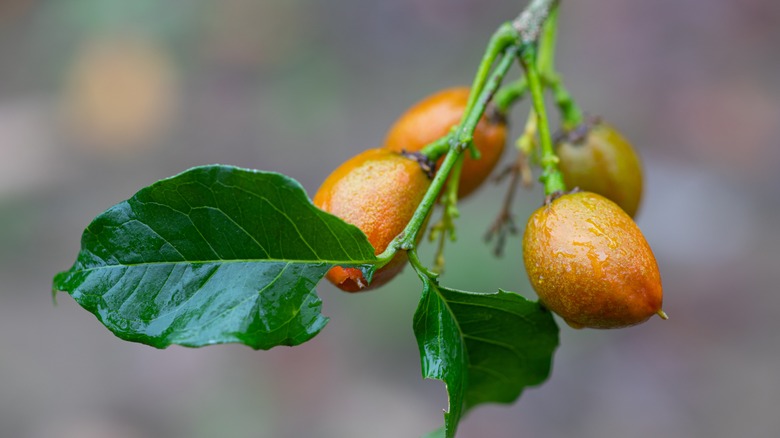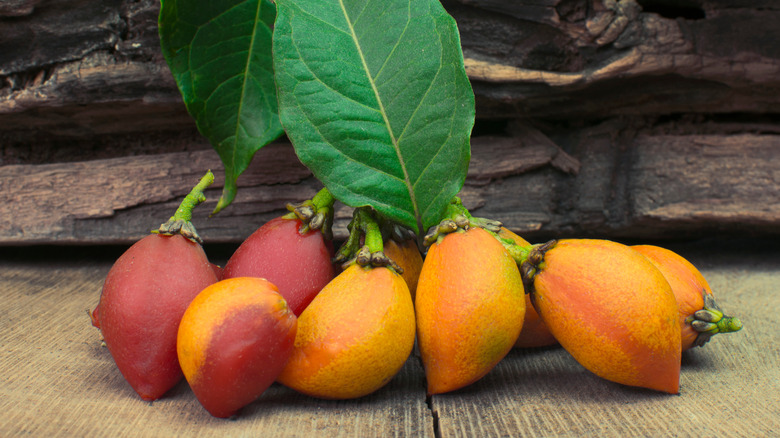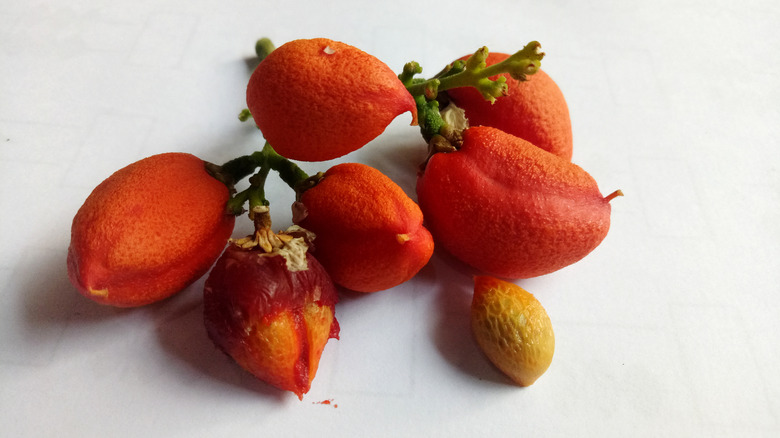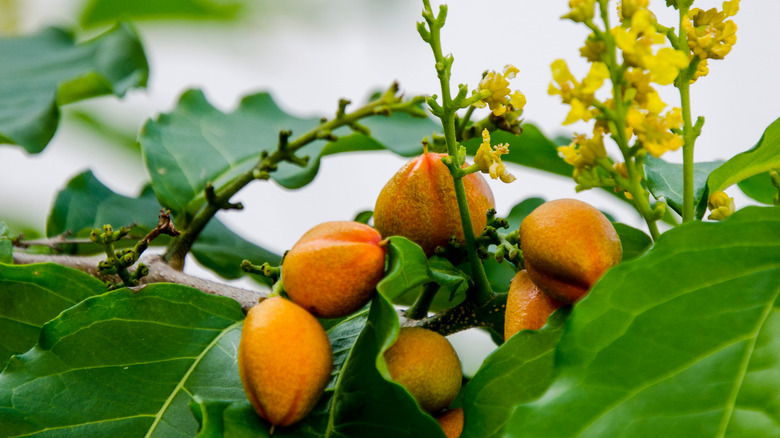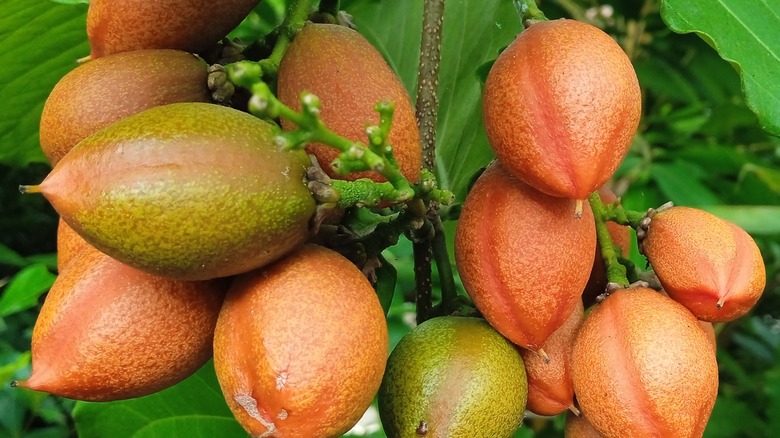Does Peanut Butter Fruit Actually Taste Like Peanut Butter?
Peanut butter lovers, do we have fruit for you. And for those with peanut allergies, fear not; peanut butter fruit may be the answer you've been looking for. Imagine tasting peanut butter sandwiches without the risk of any allergic reactions. Now that we have your attention, get ready to learn all about the fruit that, yes, gives major peanut butter vibes.
The tropical peanut butter fruit tree (Bunchosia argentea or Bunchosia armeniaca) yields bright yellow blossoms and glossy red fruits that look like either small tomatoes or grapes, per Specialty Produce. Also known as Monk's Plum, the University of Florida reports that this plant can be found in Central and South America, and, true to its advertised name, smells and tastes like peanut butter. If you've been looking for peanut butter alternatives, this pretty fruit packs a surprising punch and may be able to step up to the task of all your peanut butter needs.
What is peanut butter fruit?
The tree that yields peanut butter fruit is nice to look at, even without batches of the brightly-colored fruit, notes Why Farm It. Best grown in tropical climates, these trees can grow to be over 20 feet tall and yield fruit twice each year, both during the spring and summer seasons. Vividly green leaves offer shade before tiny yellow blossoms appear.
As the fruit of the peanut butter tree grows ripe, the colors of the small fruits change from green to a bright red hue. When the fruits are finally ripe, harvesters have to work fast. Peanut butter fruits should be collected and eaten or properly stored as quickly as possible, advises Den Garden, since the fruits can perish. Luckily, the fruits don't need to go through any processing before they can be enjoyed; simply eat the fruit as you would a grape, spitting out seeds or using the pulp to make smoothies, jams, or even ice cream.
What does peanut butter fruit taste like?
Your best bet at finding peanut butter fruit to try is in the summer and fall months, but because the fruit is a delicate one, they don't ship well, notes Specialty Produce. For those lucky enough to get their hands on a batch, you're in for a treat.
As you eat more of the fruit, the peanut butter flavor becomes more noticeable, states Den Garden. Why Farm It compares the fruit's texture to that of figs, while Atlas Obscura likens the pulp to actual peanut butter spread (the smooth kind), with extra flavors of sweet potatoes and berries. That's right: It isn't only peanut butter you'll be tasting. Peanut butter fruit delivers both a peanut butter flavor and the sweet notes of a homemade jam.
If you're allergic to peanuts, peanut butter fruit might be the solution for your peanut-butter-flavored culinary projects. We're imagining what a sandwich made with this fruit might taste like.
Nutritional information
Not only do peanut butter fruits taste good, but they are also good for you, too. Why Farm It reports the fruit is high in antioxidants and fiber, similar to acerola cherries, a health-boosting superfood.
In 2013, a study was conducted evaluating the antioxidant levels of peanut butter fruits, and in 2018, another study evaluated both antioxidant properties and polyphenol content. The research showed peanut butter fruit to be an excellent source of carotenoids, notes Specialty Produce, and though small in size, the fruit delivers almost ten times the amount of lycopene found in tomatoes. According to Healthline, lycopene has been shown to protect against certain cancer types, promote heart health, and even protect against sunburn.
If you need further reason to try to track this fruit down, Fruits Info notes peanut butter fruits can lower harmful cholesterol levels. Now we're thinking about how this fruit can boost the nutritional profile of our next batch of peanut butter bars.
Where to buy peanut butter fruit
Specialty Produce notes that the tree thrives in warm climates where sun exposure is at a maximum, though shady areas can also see plants thrive; think Australia, Florida, California, and Hawaii in addition to the tree's native environment. Additionally, advises Fruits Info, the peanut butter fruit trees need to be fertilized, and since pests also enjoy the delicious fruits, harvesters need to shield the fruits from unwanted pests.
Per Why Farm It, a peanut butter fruit tree can take three years before bearing fruit, and that first harvest usually yields fruit that is smaller in comparison to future yields. Each stem will produce two fruits. When the fruit is ready to be harvested, work must be done quickly so that the fruits don't go bad on the tree. Because of the peanut butter fruit's temperamental nature, the fruit can be refrigerated or the pulp can be frozen, but peanut butter fruit is best when consumed fairly shortly after being removed from the tree.
Unsurprisingly, it's rare to find these fruits at an actual supermarket, admits Fast Growing Trees, but depending on where you live, you can test your green thumb and try growing a peanut butter fruit tree yourself.
